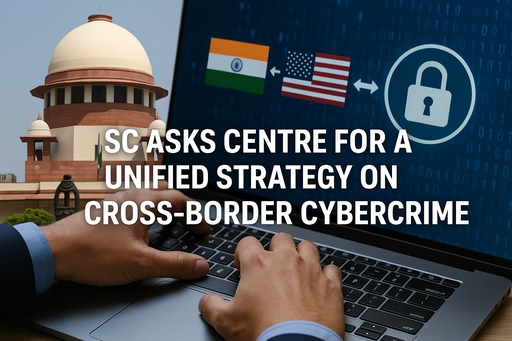
SC Asks Centre for a Unified Strategy on Cross-Border Cybercrime
The Supreme Court (SC) of India’s recent directive to the central government to develop a unified strategy for combating cross-border cybercrime underscores the urgent need for legal and administrative reforms in the digital realm. Cybercrime, especially of a transnational nature, poses significant challenges to national security, data sovereignty, and individual privacy. Here’s an overview of the issue, the legal framework, and the way forward:
Understanding Cross-Border Cybercrime
Cross-border cybercrime refers to unlawful activities conducted in cyberspace where perpetrators, victims, or infrastructure span multiple jurisdictions. Common forms include:
- Identity theft: Stealing sensitive personal information for financial or other gains.
- Phishing attacks: Deceptive methods to acquire confidential information.
- Ransomware: Malicious software that encrypts data and demands payment for its release.
- Cyber espionage: Unauthorized access to state or corporate secrets.
- Child exploitation materials: Distribution of illegal content across jurisdictions.
These crimes exploit jurisdictional boundaries, weak international legal cooperation, and the anonymity provided by technology.
Legal Framework Governing Cybercrime in India
India’s current laws address cybercrime under various statutes, but gaps remain in tackling transnational offenses.
1. Information Technology Act, 2000 (IT Act)
- Section 66A (repealed): Previously penalized offensive messages online.
- Section 66C: Focuses on identity theft.
- Section 66F: Addresses cyberterrorism.
- Section 75: Extends the applicability of the Act to offenses outside India if they involve a computer, network, or person located in India.
2. Indian Penal Code, 1860 (IPC)
- Section 420: Punishes cheating, often relevant in cyber fraud cases.
- Section 463–470: Address forgery, including online document fraud.
3. Mutual Legal Assistance Treaties (MLATs)
India has agreements with several nations to facilitate cross-border evidence sharing.
4. International Conventions
India is not a signatory to the Budapest Convention on Cybercrime, which is the primary international treaty addressing transnational cybercrime.
Challenges in Addressing Cross-Border Cybercrime
- Jurisdictional Issues: Determining which country’s laws apply in cross-border incidents is complex.
- Limited International Cooperation: Lack of robust treaties and reluctance of nations to share data hinders effective investigations.
- Technology Evolution: Cybercriminals exploit advanced technologies like blockchain and AI to evade detection.
- Insufficient Domestic Frameworks: While India has strong cyber laws, enforcement mechanisms need strengthening, especially for international cases.
Supreme Court’s Directive
In a recent public interest litigation (PIL), the Supreme Court emphasized the need for a comprehensive and cohesive strategy to counter transnational cybercrimes. The SC observed:
- Coordination among stakeholders: The Centre must work with state governments, law enforcement agencies, and international organizations.
- Technology adoption: Use of AI and machine learning for real-time monitoring of cyber threats.
- Legislative updates: Address the inadequacies in the IT Act and explore becoming a signatory to the Budapest Convention.
Proposed Unified Strategy
1. Strengthening Legislative Frameworks
- Amend the IT Act to explicitly address transnational crimes and regulate intermediaries like social media platforms.
- Consider enacting a comprehensive Data Protection Law aligned with global standards like GDPR.
2. Enhancing Law Enforcement
- Train law enforcement personnel in advanced cyber forensic techniques.
- Establish cybercrime task forces at state and national levels to work on cross-border cases.
3. Promoting International Cooperation
- Advocate for India’s participation in global conventions such as the Budapest Convention.
- Strengthen MLATs and foster collaboration with INTERPOL and UNODC.
4. Encouraging Public-Private Partnerships
- Collaborate with tech companies to trace criminal activities and develop secure digital ecosystems.
- Encourage ethical hacking initiatives to identify vulnerabilities.
5. Educating and Empowering Citizens
- Launch awareness campaigns about online frauds, phishing, and privacy protection.
- Introduce cyber hygiene education in schools and colleges.
Conclusion
The Supreme Court’s call for a unified strategy highlights India’s acknowledgment of the increasing threats posed by cross-border cybercrimes. While current frameworks address domestic cybercrime, transnational offenses demand a robust, multi-faceted approach. Strengthening laws, fostering international collaborations, and leveraging technology will be pivotal in ensuring a secure cyberspace for individuals, businesses, and the nation.












comments